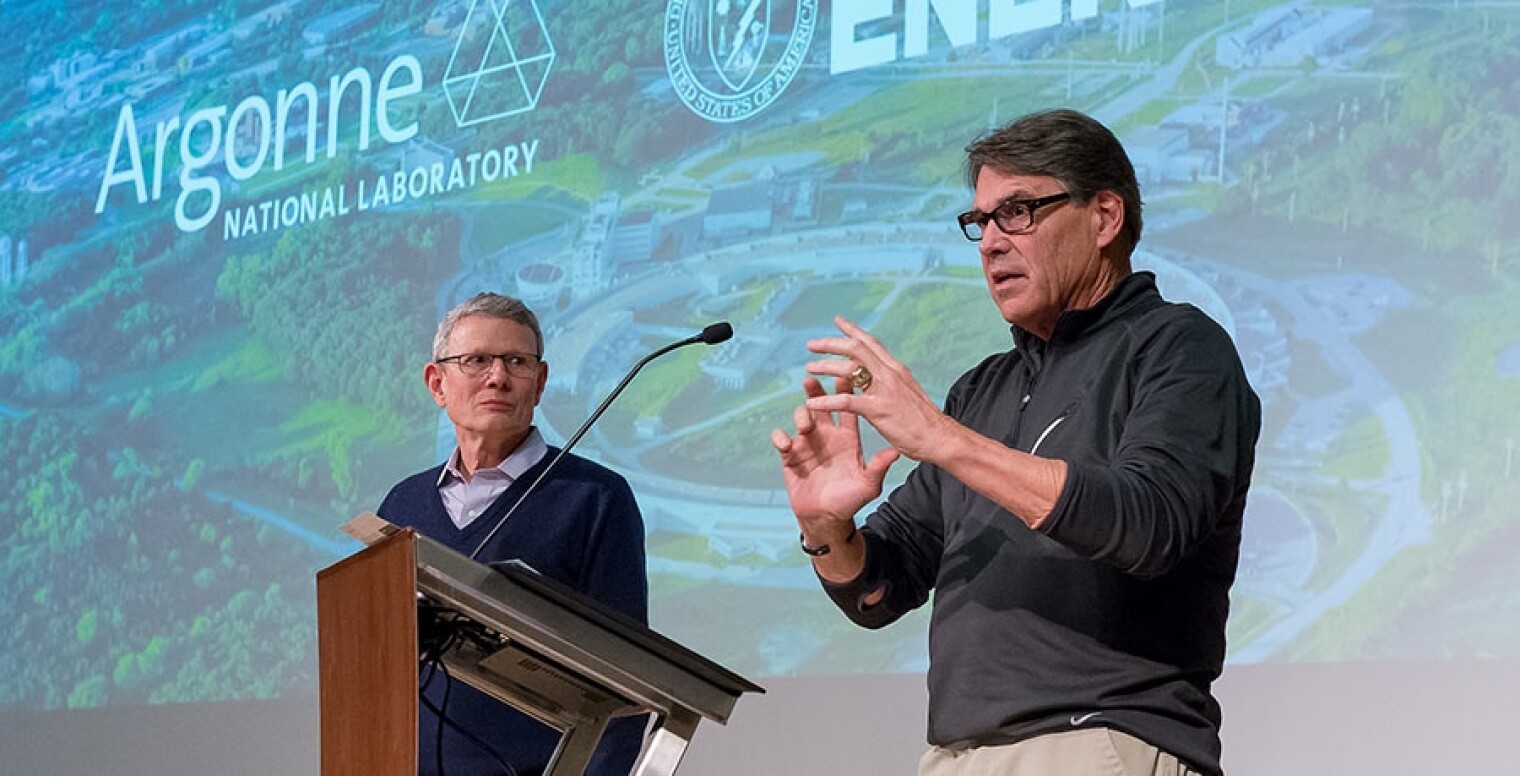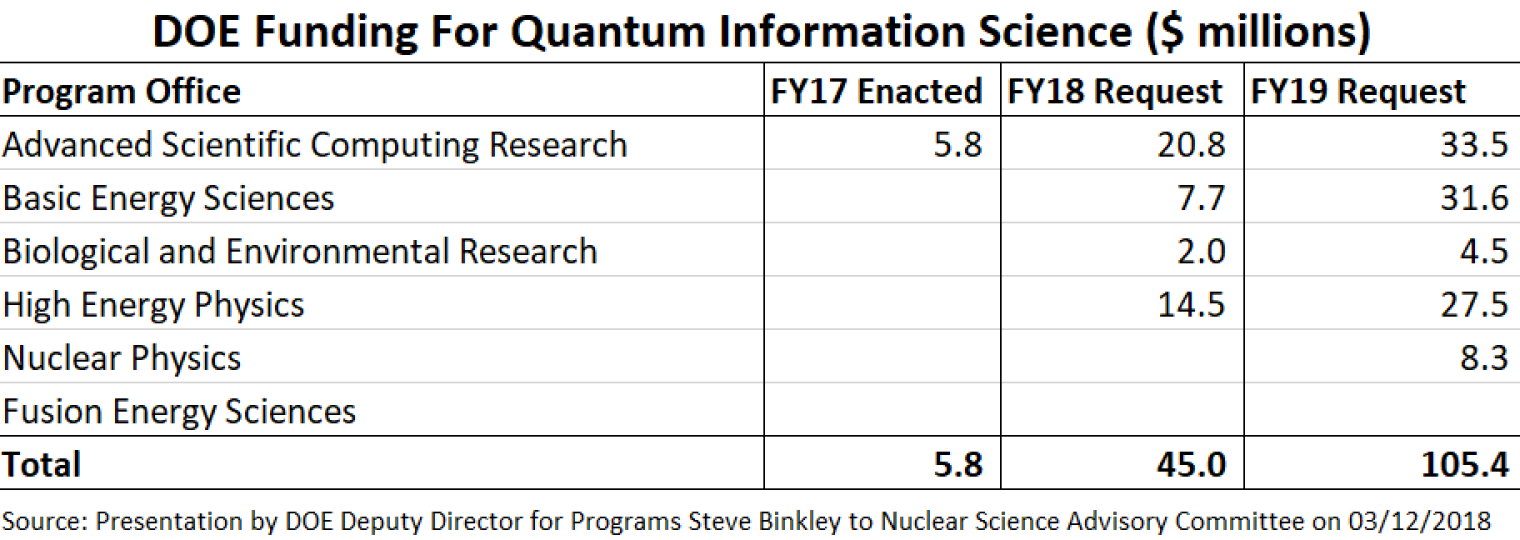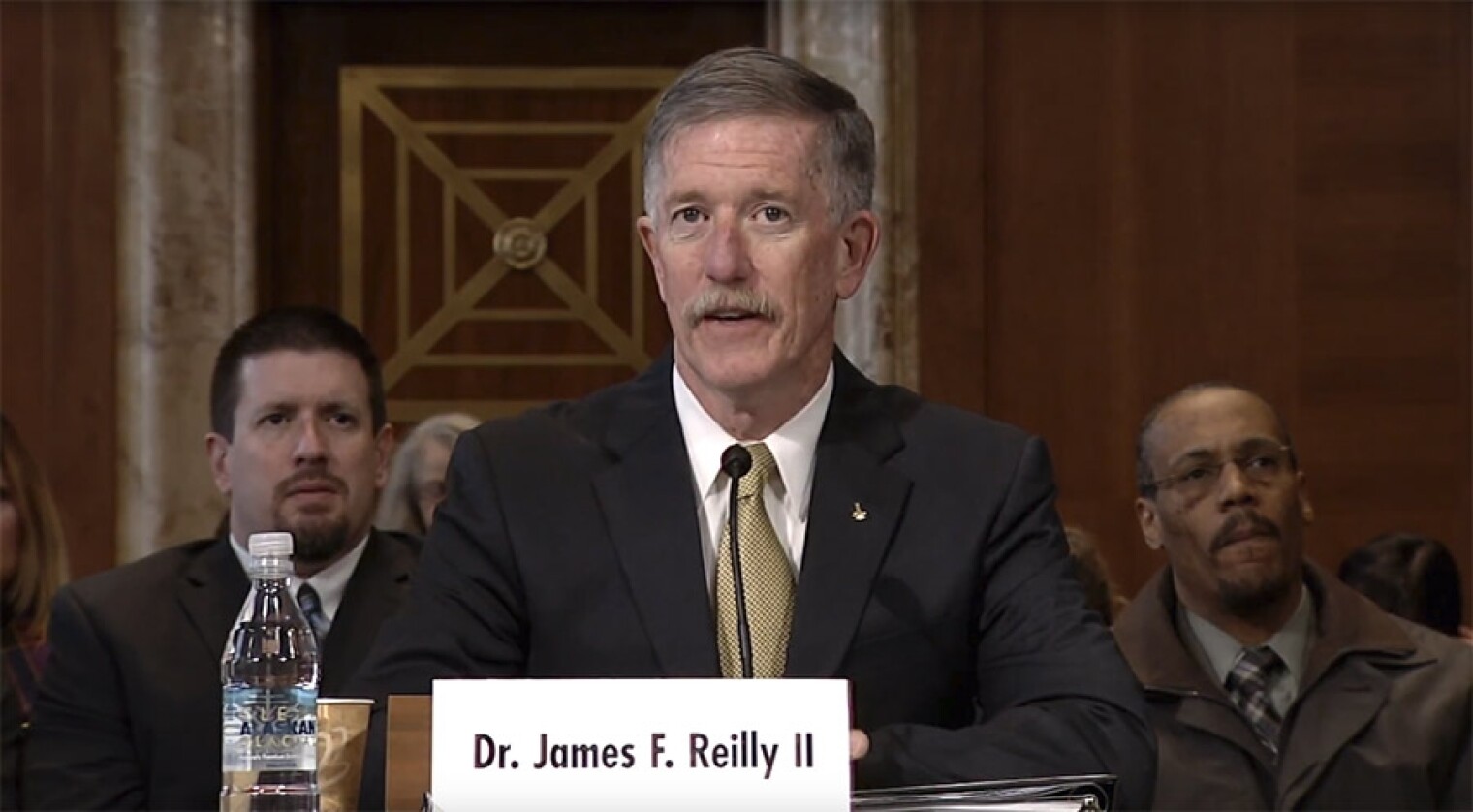| |
What’s Ahead
 |
| Energy Secretary Rick Perry, right, addressing Argonne National Laboratory employees on Jan. 9, accompanied by laboratory director Paul Kearns. Perry will keynote the ARPA-E Summit at National Harbor, Maryland, on Wednesday, and appear before the House Energy and Water Development Appropriations Subcommittee on Thursday to answer questions about the president’s budget request for the Department of Energy. On Wednesday, Kearns will appear before the House Science Committee for a hearing on innovation at national laboratories. (Image credit – Argonne National Laboratory) |
DOE Lab Leaders Testifying Before Science Committee
On Wednesday, the House Science Committee is holding a hearing to “examine the broad scope of innovative basic science, early-stage applied research, technological development, and national security work” done at the Department of Energy’s national laboratories. The committee also plans to use the hearing to examine how DOE priorities affect the labs’ portfolios and to hear lab leaders’ views on how the lab system should be managed. Three lab heads are appearing before the committee: Argonne National Laboratory Director Paul Kearns, SLAC National Accelerator Laboratory Director Chi-Chang Kao, and Idaho National Laboratory Director Mark Peters. Also testifying are Mary Maxon, associate lab director for biosciences at Lawrence Berkeley National Laboratory, and Susan Seestrom, the chief research officer for Sandia National Laboratory.
FY19 Science Budget Review Ramping Up as Final FY18 Bill Nears
As Congress works to assemble the final combined spending bill for fiscal year 2018, which could be released as early as this week, it will also ramp up its review of President Trump’s fiscal year 2019 budget request with a series of hearings. Trump administration representatives heading to Capitol Hill this week include:
- DARPA Director Steve Walker and top R&D officials from the Army, Navy, and Air Force, who will appear before the House Armed Services Committee on Wednesday;
- Energy Secretary Rick Perry, who will appear before the House Appropriations Committee on Thursday; and
- National Science Foundation Director France Córdova and National Science Board Chair Maria Zuber, who will appear before the House Science Committee on Thursday.
See the Upcoming Events section for additional science-related budget hearings occurring this week. Members of Congress have also started to circulate “Dear Colleague” letters to justify increased funding for favored agencies. Among them is a letter focused on the DOE Office of Science led by Reps. Randy Hultgren (R-IL), Ben Ray Luján (D-NM), Lee Zeldin (R-NY), and Bill Foster (D-IL).
DOE Leaders Keynoting ARPA-E Summit
Top Trump administration officials are scheduled to speak at the Advanced Research Projects Agency–Energy’s annual conference this week in National Harbor, Maryland, even though the administration has again proposed to zero out funding for the agency. Under Secretary for Science Paul Dabbar and Energy Secretary Rick Perry will cap off keynote sessions on Tuesday and Wednesday morning, respectively. Just prior to Perry’s remarks, Michael Kratsios, the top political appointee in the White House Office of Science and Technology Policy, will also speak. Perry has spoken highly of ARPA–E before Congress, and suggested it could be reorganized rather than eliminated. Two strong congressional backers of the agency, Sen. Lamar Alexander (R-TN) and Rep. Eddie Bernice Johnson (D-TX), will deliver statements via video. Alexander has advanced a spending bill that would increase ARPA–E’s budget by 8 percent to $330 million, and Johnson is the lead sponsor of bipartisan legislation that would authorize a five-year funding ramp up for the agency.
Goddard Symposium to Link Space Science, Tech, and Exploration
The American Astronautical Society’s 2018 Robert H. Goddard Memorial Symposium is taking place Tuesday through Thursday at the NASA Goddard Space Flight Center (GSFC) in Greenbelt, Maryland. The theme this year will be “Exploration, Science, and Technology: Partnerships for the Next Decade.” Among the speakers will be Acting NASA Administrator Robert Lightfoot, NASA Science Mission Directorate head Thomas Zurbuchen, Sen. Chris Van Hollen (D-MD), and several other senior NASA science leaders. Stephen Volz, NOAA’s assistant administrator for satellite and information services, will be giving a luncheon address on Thursday. All sessions, except for the luncheons, will be webcast.
Senators to Examine DOE Defense Program Needs
The Strategic Forces Subcommittee of the Senate Armed Services Committee is holding a hearing on Wednesday on the Department of Energy’s defense and environmental management activities. Lisa Gordon-Hagerty will be appearing before a congressional committee for the first time in her new role as head of the National Nuclear Security Administration. The other witnesses will be the acting head of DOE’s Office of Environmental Management, the head of the Naval Reactors program, and the Government Accountability Office’s director for natural resources and environment. The hearing is intended to inform preliminary work on the fiscal year 2019 National Defense Authorization Act and to review spending projections for future years.
DOE and NSF Detailing FY19 Budgets to Nuclear Science Advisory Panel
On Monday, the heads of the Department of Energy’s Office of Science and the National Science Foundation’s Mathematical and Physical Sciences Directorate are delivering their first briefings to a DOE advisory committee since the fiscal year 2019 budget request was released. Presentations from meeting are already available here, and a video of the event will be posted here. Among the subjects they will discuss is the large proposed ramp up in funding for quantum information science at both agencies. The Nuclear Science Advisory Committee will also release its annual assessment of the National Nuclear Security Administration’s program to bolster production of molybdenum-99, a radioisotope used in numerous medical imaging procedures.
 |
| Increasing funding for quantum information science across several programs is a top priority in the Department of Energy’s budget request for fiscal year 2019. |
NASA Earth Science Panel to Discuss Decadal Report
NASA’s Earth Science Advisory Committee will meet Wednesday and Thursday. Among the items on the agenda is the National Academies’ Decadal Survey for Earth Science and Applications from Space report, released on Jan. 5. The report prioritizes 22 sets of “targeted observables” and recommends that NASA implement missions to address eight of them over the next 10 years. Ultimately, NASA will have to decide how its mission portfolio will incorporate the scientific goals identified by the survey. The advisory committee will also discuss how the division approaches international collaboration, the evolution of the its airborne science program, and how to foster high-impact research.
|
|
In Case You Missed It
 |
| (Image credit – Senate Energy and Natural Resources Committee) |
USGS Nominee Commits to Scientific Integrity at Confirmation Hearing
On March 7, the Senate Energy and Natural Resources Committee held its confirmation hearing for Jim Reilly, the nominee for director of the U.S. Geological Survey. Reilly emphasized the importance of USGS providing unbiased, high-quality scientific information and pledged he is “fully committed to scientific integrity. ” Committee Chair Lisa Murkowski (R-AK) expressed her appreciation, saying “My hope, my ask, is that you maintain that integrity within the agency.” Scientific integrity at USGS has recently been in the spotlight following reports that agency scientists resigned after Interior Secretary Ryan Zinke requested confidential data from an assessment of petroleum reserves in Alaska before public release. When Ranking Member Maria Cantwell (D-WA) asked Reilly about this specific situation and how he plans on protecting scientific integrity from “undue political influence, ” he responded, “If someone were to come to me and say, ‘I want you to change this because it’s the politically right thing to do,’ I would politely decline.”
Energy R&D Bills Advance in the Senate
Among a set of 24 bills approved by the Senate Energy and Natural Resources Committee last week was the “Department of Energy Research and Innovation Act,” which contains the first-ever comprehensive authorization for the DOE Office of Science. A committee spokesperson told FYI that it is identical to a bill that the House passed with no opposition in January 2017. The final title in the bill is the “Nuclear Energy Innovation Capabilities Act,” which directs DOE to undertake a variety of activities to promote the development of advanced nuclear reactors. On March 7, the full Senate passed on a voice vote a different version of the act that includes an additional provision authorizing a DOE cost-sharing program for assisting companies in obtaining licenses for advanced reactors. The committee also advanced the “Advanced Nuclear Energy Technologies Act,” which would direct DOE to carry out advanced nuclear reactor demonstration projects, and the “Energy Technology Maturation Act,” which authorizes a DOE program that facilitates the commercialization of technologies developed at department facilities.
Science Committee Reaffirms Support for Fusion R&D
The House Science Committee held a subcommittee hearing on March 6, at which leaders from the nuclear fusion research community testified about the value and prospects of their work. Committee members from both parties adhered to the support they have expressed in recent years for fusion research. Committee Chair Lamar Smith (R-TX) also urged Congress to exceed the president’s budget request for the France-based ITER project and honor the U.S.’s full commitment to it. ITER Director-General Bernard Bigot testified that near-term U.S. contributions are critical to avoiding new schedule delays and cost increases. Separately, Mark Herrmann, director of the National Ignition Facility (NIF) at Lawrence Livermore National Laboratory, warned of the consequences of the president’s proposed cuts to the National Nuclear Security Administration’s inertial confinement fusion (ICF) program. He said that, if enacted, the cuts would hamper deliverables for the Stockpile Stewardship Program and shut down the pipeline of students and early career researchers who replenish the ICF workforce.
Editor’s Note: The FYI bulletin published last Friday, “Science Committee Seeks Renewed Commitment to Fusion Research,” incorrectly stated that Herrmann said NIF is on track to achieve ignition by 2020. In fact, he stated NIF is on track to meet the goal of assessing by 2020 the facility’s efficacy for achieving ignition, and he expressed optimism that NIF ultimately will achieve ignition.
NASA Astrophysics Mission Continuity Concerns Raised at Hearing
At a March 7 hearing of the House Science Committee’s Space Subcommittee, Ranking Member Ami Bera (D-CA) questioned Acting NASA Administrator Robert Lightfoot about whether the agency’s focus on exploration in its fiscal year 2019 budget request is coming at the expense of other mission areas, including science. He specifically expressed concern about the plan to cancel the Wide Field Infrared Survey Telescope (WFIRST), the top large mission priority identified in the latest astronomy and astrophysics decadal survey. Moving away from “ scientific-based prioritization” like decadal surveys sets a “ dangerous precedent,” Bera said, adding that switching science missions every time a new administration arrives would be costly. In response, Lightfoot acknowledged there would a gap in astrophysics data due to the planned cancellation of WFIRST, but he suggested that the funds freed up could be used to “ perhaps get the data in a different way.” He added that, “ We’re counting on the [Transiting Exoplanet Survey Satellite] and James Webb [Space Telescope] to fill the astrophysics needs for quite a bit of time.”
R&D Funding Rhetoric in White House Report Clashes with Reality
The White House Office of Science and Technology Policy released a report last week detailing “science and technology highlights” of the Trump administration’s first year. In the foreword to the report, OSTP states that President Trump has “demonstrated his commitment to the importance of Federal scientific exploration” by requesting $151 billion for R&D programs in fiscal year 2018, an amount which the office claims is a 2 percent increase over fiscal year 2017 and represents the highest fraction of the federal budget devoted to R&D since the fiscal year 2014 budget request. However, a fact check by the American Association for the Advancement of Science concludes that these claims are “mostly untrue.” AAAS notes that the 2 percent figure does not take into account the large R&D funding increase that Congress provided in final appropriations for fiscal year 2017, and that the administration’s proposed increases were primarily for late-stage defense technology programs that are no longer officially classified as R&D. Despite the administration’s stance that early-stage R&D should be prioritized, the proposed budget would have cut overall funding for basic research by over 15 percent.
NNSA Nonproliferation Nomination Heads to Senate Floor
On a voice vote on March 6, the Senate Armed Services Committee approved the nomination of Brent Park to be deputy administrator for defense nuclear nonproliferation at the National Nuclear Security Administration. A nuclear physicist, Park is currently the head of the Global Security Directorate at Oak Ridge National Laboratory. At his confirmation hearing on March 1, Park emphasized the role of emerging monitoring technologies in preventing the spread of nuclear weapons.
|
|
Events This Week
Senate: ARPA-E congressional showcase
2:00 - 4:00 pm, Energy and Natural Resources Committee (366 Dirksen Office Building)
|
|
Opportunities NSF Seeking Input on Draft Sexual Harassment Reporting Requirements
The National Science Foundation is currently accepting public comment on its proposed implementation of new reporting requirements on sexual harassment and other misconduct. The proposed terms and conditions would require all grantee institutions to report to NSF any harassment investigations and associated disciplinary actions, and be part of the agency’s broader efforts to end sexual harassment in the scientific enterprise. Comments must be submitted by May 4.
University of California DC Office Seeking Research Advocacy Director
The University of California is accepting applications for the Director of Research position within its Office of Federal Governmental Relations in Washington, D.C. The position serves as a key advocate and policy strategist on federal scientific research and technology related issues that may affect UC campuses and national labs managed by the university though contracts with the Department of Energy. Individuals with a degree in political science or a related field and 7 to 10 years of experience in government relations focused on federal science and technology research are eligible to apply.
NIH Seeking Input on Strategic Plan for Data Science
The National Institutes of Health is currently accepting public input on its draft Strategic Plan for Data Science. NIH is specifically seeking feedback on the plan’s goals, including the appropriateness of implementation strategies as well as potential partnership opportunities and performance metrics. Comments must be submitted by April 2.
For additional opportunities, please visit www.aip.org/fyi/opportunities. Know of an upcoming science policy opportunity? Email us at fyi@aip.org.Know of an upcoming science policy event? Email us at fyi@aip.org.
|
|
Around the Web
News and views currently in circulation. Links do not imply endorsement.
White House
Congress
Political Engagement
Science, Society, and the Economy
Education and Workforce
- Email survey of US government scientists, tagged as spam, struggles for traction (E&E News)
- Visas issued to foreign students fall, partly due to Trump immigration policy (Wall Street Journal)
- Congressmen and colleges are still fighting new endowment tax (Chronicle of Higher Education)
- Many preschool teachers are scared of teaching STEM. Here’s a solution that might help (PBS NewsHour)
- Engaging girls in STEM starts in kindergarten (Education and Career News, perspective by Vanessa Stratton)
- High schools are adding more STEM classes. It may not be enough (Education Week)
- One reason students aren’t prepared for STEM careers? No physics in high school (The Hechinger Report)
- University science, tech programs should be reformed to appeal to more women: report (The Globe and Mail)
- Evidence for a mental health crisis in graduate education (Nature Biotechnology, paper by Teresa Evans, et al.)
- How female fellows fared at the Royal Society (Nature)
- GM’s Mary Barra urges action to boost women in science, engineering (Bloomberg)
- Arizona State suspends Lawrence Krauss during inquiry over sexual misconduct accusations (New York Times)
- Despite equal interest in STEM, girls trail boys in readiness (Education Week)
- Governors’ top education priorities in 2018 state of the state addresses (Education Commission of the States, report)
Research Management
- Nature journals encourage researchers who submit papers that rely on bespoke software to provide the programs for peer review (Nature, editorial)
- Low agreement among reviewers evaluating the same NIH grant applications (PNAS, paper by Elizabeth Pier, et al.)
- Fund ideas, not pedigree, to find fresh insight (Nature, perspective by Thomas Sinkjaer)
- Perish not publish? New study quantifies the lack of female authors in scientific journals (The Conversation, perspective by Ione Fine and Alicia Shen)
- A curious blindness among peer review initiatives (The Scholarly Kitchen, perspective by Tim Vimes)
- Meta-analysis and the science of research synthesis (Nature, paper by Jessica Gurevitch, et al.)
- NAS, researcher want court costs covered after ‘abusive’ claim (E&E News)
Labs and Facilities
Energy
Space
Weather, Climate, and Environment
Defense
Biomedical
International Affairs
|
|
|
| |
| |
|


